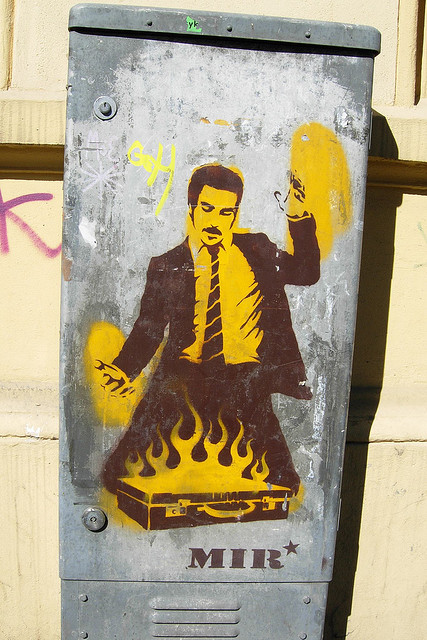|
|||||||||||||
Capitalism is Opposed to Human Happiness Debate, Volume 2
Posts #116-#120
Post #116
Arie wrote: All I did was to present a case that CNT-FAI-Radical's system as I understood it would generate much worse results in terms of productivity than capitalism or even the normal state-monopoly-on-capital socialism. Although now I think he doesn't have a coherent system in mind, just slogans, since he contradicts himself about the basic laws of his world. The question of legitimacy of the law or the law as defining legitimacy is an entirely different debate which I don't believe I brought up. I could just as well have said "you assume the capital legally belongs to the investor". That was my impression in the context of some of your statements, by bringing up the importance of capital contributed by its owners (as determined by law). But I could be mistaken. There might be some contradictions in RADICAL's statements. Like you, I'm also baffled about how to implement anything without laws or rules -- "Anarchy" seems to be somewhat paradoxical in practice. But there is some ethical foundation to RADICAL's beliefs, which I believe is as follows: 1. A man can own things for his personal benefit as long is it harms no one else. 2. This excludes the right to own things merely for the purpose of keeping others from using them, because that's interpreted as harming them (at least in a relative sense). 3. Ownership of capital is usually this type of ownership, keeping others from using it unless they meet your conditions (pay, etc.) That can be viewed as extortion. If we follow these foundations, we would not permit capital ownership as it exists today. But we could still pay people for their work. So if some workers develop a means of production for someone else to use, they cannot withhold it from that someone else, but they can charge him for the labor they invested in making it. Theoretically. In practice, how do you decide what to charge? Probably by market negotiations and making deals, etc.: The details can circumvent the concept and determine what actually happens, regardless of what you call it. Post #117
Quote: I meant that workers actually have bargaining power and are not the helpless slaves as people here portray them. People also get a minimal income without working, even if they refuse to work at all (at least where I live). Quote: So it is not allowed for anyone to own capital outside the company you currently work at? That would be the logical conclusion. If you establish a new firm you will only get credit from other companies which are owned by their workers. I don't see any benefit here. There will still be workers (or capitalists, this seperation is stupid anyway) who own more of the company then others, because some can save more of their salaries. Post #118 I agree with some of this. However, it assumes that production and human happiness are diametrically opposed. This can be the case but I would argue that it's more often not the case. Post #119
Rugoz wrote: They were (helpless slaves) at some time and some places: In an environment with very few large capitalists and very many workers the workers have a large bargaining disadvantage, unless they consolidate into equally few and large unions. Those were/are the environments in which workers without protections are exploited and anti-capitalism strikes a chord. Rugoz wrote: I think that's a good idea but is better implemented in terms of a minimal share (of what there is) rather than a minimal fixed amount based on the presumption of availability (that's how state welfare systems collapse). Also it is more acceptable if we abandon the working class notion that we have to work for a living, and realize we are entitled to "gifts of God" or nature that are not the result of labor. With abolition of slavery, we establish that we each have a right to own ourselves, our own life. The next step is to establish that we also have a right to own vital resources, which are essential to our life, if they are available. Quote: Rugoz wrote: It's a different system. The anti-capitalist ideal is that all companies will be "owned" by their workers. I don't see the disadvantage, and the benefit, of course, is to the workers. There are probably different possible implementations. I suppose one possibility is that they use saved income to consume more personal goods and services at a later time or even buy capital (within or outside the company) as long as they also work on that capital: They are not allowed to benefit from the mere ownership of capital, but they are allowed to benefit from producing with that capital. I would prefer retaining the free market capital ownership system, but with that ownership distributed more democratically (thereby making everyone a capitalist). Post #120
Cecil James wrote: I don't think anyone here assumes that "production and human happiness are diametrically opposed". The original proposition in this thread was closer to saying that 'capitalism and human happiness are diametrically opposed'.
|



